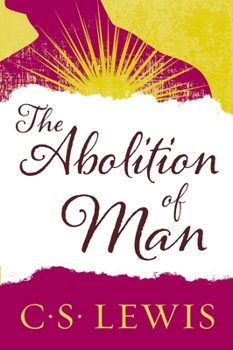The Abolition of Man
Select Format
Select Condition 
Book Overview
C.S. Lewis's Classic Work that Is Number 7 on National Review's List of "100 Best Nonfiction Books of the Twentieth Century"
In The Abolition of Man, C.S. Lewis sets out to persuade his audience of the importance and relevance of universal values such as courage and honor in contemporary society. Both astonishing and prophetic, The Abolition of Man is one of the most debated of Lewis's extraordinary works.
Format:Paperback
Language:English
ISBN:0060652942
ISBN13:9780060652944
Release Date:April 2015
Publisher:HarperOne
Length:128 Pages
Weight:0.27 lbs.
Dimensions:0.4" x 5.4" x 7.9"
Age Range:16 years and up
Customer Reviews
3 ratings
The dangers of moral relativism
Published by Thriftbooks.com User , 21 years ago
In this short book, CS Lewis takes public education for his subject, though the scope of the work goes well into the philosophical and ethical realms. The master Christian apologist is here arguing against what he sees to be the evils of moral relativism. His essay "Men Without Chests," reminiscent of TS Eliot, speaks of just what would happen if we were to lose all sense of good and bad, and chose instead to attempt to see everything in a purely `objective' way, without regard for what has been established as right and wrong. The rest of the book develops and plays upon this idea, and Lewis examines the possibilities of a civilization who abandons "The Tao" (the name Lewis gives to a widely accepted system of moral values) and tries instead to mold its citizens into whatever form its leaders should decide. Of course, this is exactly what Lewis warns again in his Science Fiction novel That Hideous Strength, and what is also seen in the book 1984. To me, the highlight of this book was the appendix. Superbly compiled, it is Lewis's definition of "The Tao," and features a number of moral values (such as one's obligation to society and duty to parents). The best part of this, though, is that Lewis quotes from an enormous range of sources, citing everything from Plato to Beowulf to the Bible to Egyptian writings to show that these are values which have been widely accepted throughout history. This is his basis for calling "The Tao" the ultimate system of moral values, and his justification through widespread acceptance is very good indeed. I believe this is one of CS Lewis's best works, full of inspirational thoughts on morality and warnings against using Science to make man a part of `Nature' and losing all respect for man as a Divine Creation. His book God in the Dock goes along well with this one--many of the essays in that book coincide nicely with those in this one. Once again, CS Lewis has proven himself a master of putting things in a way everyone can understand.
The Best and the Worst of C.S. Lewis
Published by Thriftbooks.com User , 22 years ago
This book shows Lewis at his best and at his worst. At his best, he is a sharp social critic, a lucid expositor, and a man with an uncanny ability to get right down to the heart of the spiritual perplexities and self-deceptions that vex us in our daily lives, and open them up to the light of reason. I'm one of many people who owe a deep debt to this man, and I revere him as much as any one of the 5-star reviewers here.But Lewis, as a writer, had serious faults as well. Though he was a generous reader, he was not a generous arguer: his idea of a good argument was to seize upon some poor schmo who epitomized some (then) current silliness and beat him senseless (with wonderfully powerful, clear, simple prose.) The spectacle is always fun, but it sometimes feels like watching Muhammed Ali boxing Peewee Herman -- you've always wanted to see it, but you have an uneasy feeling that what you're watching is not real boxing.So to read this book properly, you need to understand two things. First, it is not a work of academic philosophy, and it won't stand up as such. That is to say, Lewis did not go out and look for the primary exponents of moral relativism of his time and wrestle them to the ground. He doesn't "survey the literature." He doesn't take on the important relativist philosophers. Instead he seizes this poor anonymous English textbook-writer by the collar and thrashes him soundly, and then goes on to pile up a sort of "everyone says so, so it must be true" defense of traditional moralities. Academic philosophers will no doubt recoil from this book in horror. It is not their sort of book, and it doesn't play by their rules.Lewis is speaking to a different audience, and he has a different goal in mind. He's not speaking to people who have read lots of difficult philosophy: he's speaking to people who have picked up little bits of fashionable modernist dicta and have fashioned a pseudo-philosophy out of them. He wants to demolish -- not serious, reasoned relativism, but popular, stupid relativism. The person who says that "Einstein proved all things are relative, so there can't be any such thing as absolute right or wrong" -- that's the person Lewis wanted to drop on the mat. And he succeeds in that brilliantly.The second thing you need to understand, to read this book properly, is that it is attempting to recreate some of Lewis's own journey out of relativism. And here we get to another of Lewis's faults: he wrote too fast. His pile of examples of universal morality could be mistaken for an attempt to prove that there are universal moral principles and all thoughtful moral people have always known it and stuck to them. As such, it would stand as one of the shoddiest jobs of argument ever presented. But that's not really what he's up to, though he really ought to have explained what he was doing more carefully. What he is doing is presenting, in a few pages, the experience he himself had of years of voracious reading in various traditions -- the ex
Reads like an open letter to Richard Rorty. . .
Published by Thriftbooks.com User , 24 years ago
. . . but written when Rorty was still in diapers. This is by far the most prophetic, and the most disturbing, of Lewis' works. Starting with a deceptively simple observation - that modern (now postmodern) philosophy tends to reduce all statements of value to mere statements of subjective feeling - Lewis goes on to demonstrate the corrosive and ultimately fatal effect of this line of thinking on any civilized culture. Lewis accurately predicts the parallel development of two trends: (1) the loss of any objective transcendent moral standards; and (2) the ability of a scientific or political elite, through social conditioning and/or genetic manipulation, to affect the thinking of successive generations of the rest of us - the great unwashed. The ascendancy, during the last decade, of moral relativism and the political correctness movement demonstrate how far down these parallel tracks we have come (i.e., Rorty: truth is what gets us what we want; truth is what my peers will let be get by with saying; Christians are "the natural constituency of Hitler"). While he's at it, Lewis refutes the postmodern, and generally unexamined, truism that the historic moral principles of Western Civilization are fundamentally different from other cultures' norms, and thus are arbitrary and nonbinding. In a lengthy appendix, Lewis shows that the great moral principles are timeless and have been generally accepted by all civilized societies, at all times (until ours). So where will it end? In an ironic conclusion, Lewis predicts that what will be hailed an man's ultimate victory over Nature (such as human cloning?) will actually be Nature's ultimate victory over man. This will occur when we can fully control the kind of people the next generation will be (i.e., how they think), but in the absence of moral standards, this choice will be made arbitrarily; that is, according to purely Natural impulses - thus we have the Abolition of Man as man and the ascendancy of man as animal. I must take issue with the reviewer who referred to the book as a "disguised apologetic" for Christianity. While Lewis openly acknowledges his Christian beliefs, he takes great pains to establish that the existence of objective moral standards is transcultural; that it is "trans-" any specific religious or ethical system other than relativism. Those who insist otherwise are simply out of touch; controlled by their own hermeneutic of suspicion, they see closet Christians lurking behind any and all moral absolutes. A final point - I must also disagree with the reviewer who referred to the book too difficult for the average reader. I'm an accountant, I have no training in philosophy, and I'm definitely not a candidate for MENSA membership - but I had no trouble "getting it." Light reading it's not, but, hey, it's short, the type is large, the book is cheap, and it's written in Lewis' inimitable conversational style. Don't be inti
The Abolition of Man Mentions in Our Blog

Discover Irish Authors You Must Know
Published by ThriftBooks Team • March 10, 2022
Ireland is no stranger to being home to literary legends, which may partly explain why it's referred to as "The Land of Saints and Scholars." With St. Patrick's Day quickly approaching, what better time to honor these literary legends and highlight some of the best Irish authors?






